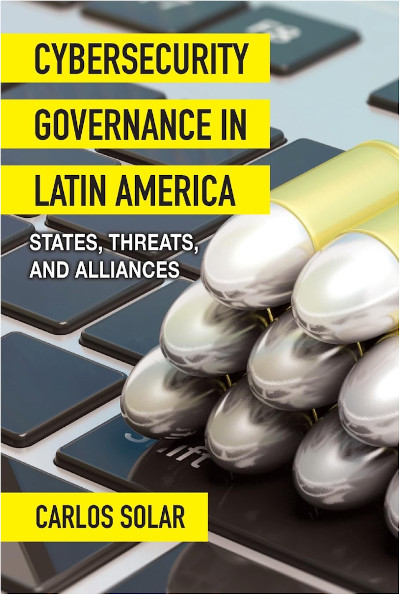In the picture
Cover of Carlos Solar's book 'Cybersecurity Governance in Latin America. States, Threats, and Alliances' (Albany: State University of NY, 2023) 340 p.
Being a area at development -continuous technical advances, new threats and subsequent solutions to avoid them, in continuous cycles of accelerated speed- the book by Carlos Solar, researcher in British universities specialized in crime and security issues, especially in the Western Hemisphere, is a very momentary snapshot of the status of cybersecurity in Latin America and the Caribbean. Solar's effort is to apply quantitative methods to the reality of this sector, so that something that in itself can be seen as ethereal - cyber, cloud, internet - can be grounded in data. The conclusions reached in the book are in line with general intuitions, so its contribution is more of a foundation on which to build than finding. Moreover, for the outsider to this field and to the particular region of the world chosen, the detail presented may seem excessive.
The most interesting aspect of this work is perhaps its finding that Latin American countries have a double face: most of them have general agreements with the United States, due to their commitment against organized crime and the need for U.S. technical support from financial aid , and at the same time they have intense commercial relations with China that involve the acquisition of equipment that can ultimately tie the different countries to the Asian giant in security matters.
Countries such as Argentina, Brazil and Chile, and to a lesser extent Colombia and Mexico, have established agreements with the US State or Defense department to receive attendance in cybersecurity. There is what Solar calls 'Digital Pax Americana' (or Latin American, as the case may be), a non-aggression between Latin American neighbors against their respective computer systems, in a way guaranteed by Washington's technological financial aid to most of them.
Although some countries would like to escape this order, Solar points out, such is the digital superiority of the United States that it would be difficult for them to try to place themselves under the umbrella of another power, such as Russia, with which Venezuela does have a special relationship (and increasingly Nicaragua), or China, which has strengthened its ties with several others, without breaking the status quo too much.
According to the author, the cybernetic power of the United States, together with the military influence of this power in a field such as cybersecurity, often directly controlled by the armed forces of each country, "constitutes a digital and physical deterrent" against any other power outside the region. "Even the most committed anti-U.S. leaders in the region depend on what such a great power can provide them in security matters. Similarly, the US plays an indispensable role on the ground in smaller-scale security policies," he says.
However, the countries in the region have been forging closer ties with China, which has become the first commercial partner for many of them, so that they have developed a duality that, curiously, they may prolong. "Latin American states can maintain separate tracks for security and trade purposes mainly because China is a distant provider , and is more concerned about US involvement in East Asia through 'proxies' than the Americas." In other words, China, at least for the time being, prefers not to strain the strategic benefit that such technological penetration can give it.
This double-sidedness is notoriously manifested in how several countries with a longstanding partnership relationship with the US, such as Chile and Brazil, have been leaving open the possibility for Huawei to develop their 5G networks, despite US pressures. In addition, Argentina, Bolivia, Ecuador, Panama and Uruguay have purchased Chinese cameras with facial recognition technology, which has generated controversy in certain sectors.
However, it is not clear that status can survive a more direct confrontation between Washington and Beijing. Solar points out how Chinese technological products have benefited many people, so that certain societies do not see China as the danger that the US paints it to be. And that, as the author seems to agree, the Chinese regime "has the skill to interfere with information and communication technology services provided by companies like Huawei".
Although these lines have focused on a specific aspect, Solar's book addresses various issues, such as Internet penetration in the region. Latin America accounts for 10.4% of the world's users of network, and has a penetration rate of 67.2%, slightly above the Middle East and below Oceania, well behind North America (95%) and Europe (85.2%). It also reviews how the main countries have organized their cybersecurity and what policies they have established in this regard, as well as the role of the armed forces or civilian authorities in this field.

